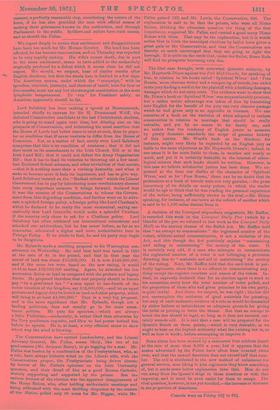A decision of the Liverpool stipendiary magistrate, Mr. Raffles, is
recorded this week in the Liverpool Daily Post (which by a blunder of the pen we referred to last week as the Liverpool Daily Mail) on the secrecy clauses of the Ballot Act. Mr. Raffles held that "an attempt to communicate" the registered number of the voters, without actual communication, is not a violation of the Act, and this though the Act positively enjoins "maintaining and aiding in maintaining" the secrecy of the voter. It is certainly very odd, if a man who attempts to communicate the registered number of a voter is not infringing a provision directing him to " maintain and aid in maintaining" the secrecy of the voting. Next, Mr. Raffles held that the card-trick is per- fectly legitimate, since there is no offence in communicating any- thing except the register numbers and names of the voters. In- deed, he expressly declared that for an election agent to send to his committee every hour the total number of votes polled, and the proportion of those who had given promises to his own party, is quite lawful. And there, we suspect, he was right ; the law did not contemplate the exclusion of good materials for guessing, but only of such authentic evidence of a vote as would be demanded by either bribers or intimidators as adequate grounds for giving the bribe or putting in force the threat. But that an attempt to break the law should be legal, so long as it does not succeed, cer- tainly sounds odd. It is said that a case will be prepared for the Queen's Bench on these points,—which is very desirable, as we ought to hear on the highest authority what the existing law is, as well as how it works, before attempting to improve it.


































 Previous page
Previous page